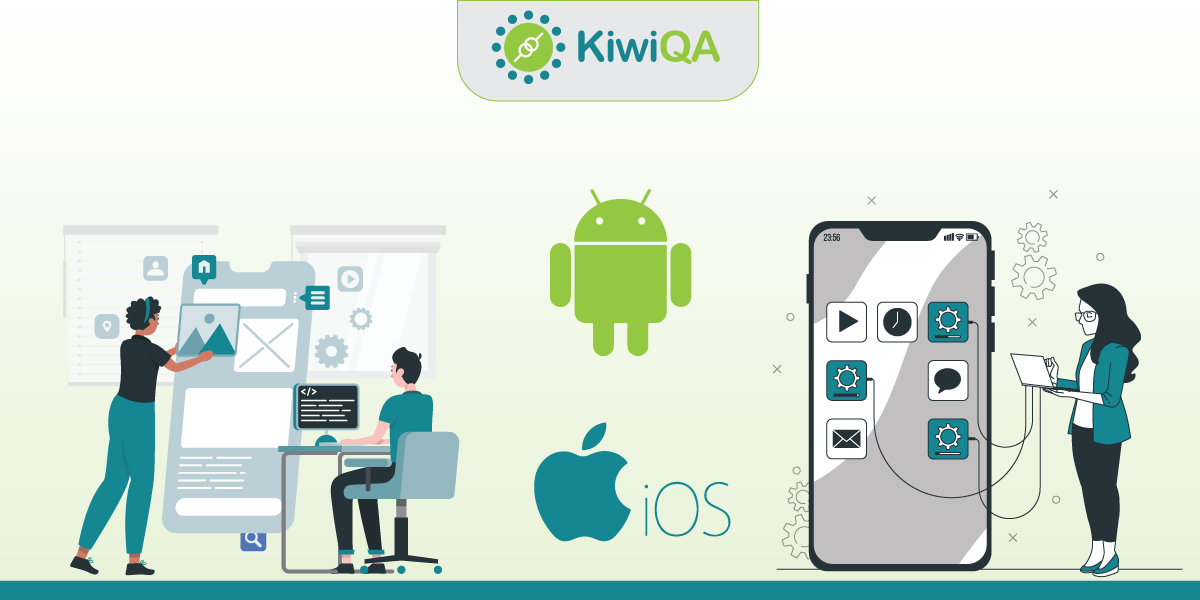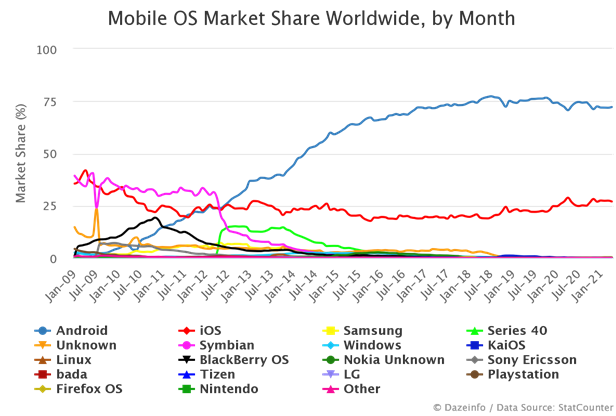Mobile phones have become the defacto devices for visiting websites. Rightly, developers ensure that the website not only renders well but also works fine on different device viewports. Mobile web experience has become extremely important for enterprises to stay relevant in the industry.
This is why development and execution of a formidable mobile app testing strategy has become more important than ever before. The growing mobile OS market share clearly answers why part of mobile app testing.
Enterprises looking to fast-track in this highly competitive market should partner with a proven global mobile application testing company to expedite TTM. Testing a mobile application can be a complex process since many apps might involve a number of complex user scenarios. Testing almost all the scenarios might become necessary to release a top-notch mobile app in the market.
Android and iOS are the two most popular mobile operating systems, rest of the OS’es enjoy only a miniscule market share. Choosing the best-suited mobile app testing tool is important to test the app from all the perspectives. In this blog, we deep dive into some of the most popular mobile app testing tools.
Also Read – How To Get Started With Mobile App Testing?
What is Mobile App Testing?
For starters, mobile app testing (or mobile application testing) is a broad term that includes the various testing methodologies for testing mobile applications. The application can be of the following types – native, hybrid, or web application.
Mobile app testing is a testing methodology for verifying functionalities and responsiveness of the application using relevant testing tools. Here are the major categories of mobile testing:
- Usability Testing: Testing the mobile application from an end-user’s perspective (i.e. usability, responsiveness, and more).
- Functional Testing: Testing the functionalities of the app to ensure that all the user-flows are working as documented in the requirements document.
- Memory Testing: Testing the app with different memory configurations. This is to ensure that the app performs well under different configurations. The app is also tested for long hours to make sure that there are no leaks in the code.
- Installation Testing: As the name indicates, this form of testing is done to ensure a smooth on-boarding (or installation) and de-boarding (uninstallation) of the app.
- Performance Testing: Here, the app is tested for its performance (i.e. under different CPU loads, network configurations, and more). Network testing can be considered as a subset of performance testing.
Based on the categories defined above, mobile automation testing tools can be classified into types like A/B testing tools, mobile defect tracking tools, cloud-based mobile emulators & simulators, real device mobile testing, and more.
Top Mobile Testing Frameworks and Tools
Now that we have covered the essentials of mobile app testing, let us look at some of the popular tools for mobile testing. Before we prepare the list, one thing that needs to be mentioned is that the choice of tool squarely depends on the category and scale of the mobile app.
A company that provides mobile testing services can provide extensive inputs on selecting the mobile testing tool that meets the budget and requirements. Without further ado, let me share the list of the top mobile app testing tools & frameworks (listed in no particular order):
Appium Framework
Appium is one of the popular open-source mobile app automation testing frameworks. As of writing this blog, the latest version of Appium is 3.2.2 (Source). The Appium framework can be used for testing a range of mobile apps – native, hybrid, and web app; irrespective of whether it is an Android or iOS app.
The framework lets you test apps on real devices as well as emulators & simulators. Many cloud-based testing tools also support Appium framework hence, mobile apps can be tested at scale using the said framework.
Also Read – Testing On Real Devices vs Simulators (Detailed Comparison)
Selendroid (Selenium for Android) Framework
As the name indicates, Selendroid is the combination of Selenium and Android. Like Appium, Selendroid is also an open-source test automation framework that helps in testing the mobile app on emulators, simulators, and real devices.
It is recommended to opt for a cloud-based real-device testing platform (or device cloud) that leverages the capabilities offered by Selendroid to test mobile apps in a secure and scalable manner. Selendroid is fully-compatible with the Selenium 3 framework. The best part about Selendroid is that no code modifications are required in the app for testing the functionalities of the app.
Like the Selenium framework, the capabilities of Selendroid can be exploited by leveraging parallel testing on emulators, simulators, and real devices. Selendroid also supports hot plugging of devices. The built-in inspector in Selendroid simplifies test case development. Getting started with Selendroid is easy, especially if you are coming from the Selenium background.
Selendroid can be used for testing native, web, and hybrid category of apps; for Android as well as iOS devices, emulators, and simulators. More information about Selendroid is available at http://selendroid.io/
Eggplant (Android and iOS) Tool
Eggplant from KeySight technologies is a GUI-based application that is useful for testing Android and iOS applications. The offering from EggPlant can be integrated with popular DevOps tools thereby helping enterprises accelerate their release cycles.
It can be used for performing functional testing, UI testing, mobile testing, cross browser testing, network testing, amongst others. In a nutshell, a single solution suffices for different QA needs. Under the hood, Eggplant uses mobile WebDriver APIs to realize mobile app automation.
Products from Eggplant can be used in attended as well as unattended modes. Along with automated testing, users also have the option to perform manual tests. On the whole, the mobile app testing tool from Eggplant is best-suited for developers and enterprises that are looking to perform E2E (End-to-End) testing.
Kobiton
Kobiton is a commercial mobile app testing platform that is used for accelerating the release of quality mobile apps using manual & automated testing on real mobile devices. The solution which is built on top of the Appium framework helps in testing native, hybrid, and web apps.
The solution is suited if you want to eliminate the expenses incurred in maintaining an in-house device lab. The Android & iOS device cloud offering from Kobiton provides the command logs, network logs, activity screenshots, video grabs, and more.
Also Read – Difference between Web App Testing and Mobile App Testing
Katalon Studio
Katalon Studio is a low-code automation testing tool primarily used for mobile and web automation testing. The best part about Katalon Studio is that the tech stack uses leading open-source frameworks like Selenium (for web testing) and Appium (for mobile app testing). The IDE built for the end-users makes it very easy to run tests.
Like other alternatives listed so far, Katalon Studio also supports automated app testing of Android and iOS apps. Like other freemium options; Katalon Studio also supports integration with leading CI/CD tools, project management tools, communication tools, and more. Since it is a low-code option, getting started with Katalon Studio is a very simple task!
Katalon Studio is preferred by companies that are on the lookout for proven web and app testing tools. If your test engineers are acquainted with Selenium and Appium, you should definitely check out Katalon Studio.
LambdaTest
LambdaTest is a popular cloud-based web and mobile automation platform that lets you test mobile apps on mobile emulators & simulators as well as real devices. As of writing this blog, mobile app testing on Android & iOS real devices is in the ‘Beta’ stage.
There is minimal learning curve involved in the entire process since the platform makes use of the Appium framework for script creation. You can test different types of apps on a range of devices on the LambdaTest cloud platform.
Like other test automation platforms, LambdaTest also supports integration with popular CI/CD tools, codeless automation tools, project management tools, bug tracking tools, amongst others.
Also Read – Reasons Why You Should Outsource Mobile App Testing
pCloudy
pCloudy is again a cloud-based mobile app offering that lets you test apps only on Android devices. In case you are building apps for the iOS market, you should use other options mentioned in the blog.
Biometric testing, real-time debugging simulation, voice interaction, and localization & geolocation testing are some of the tests that can be performed on Android device testing cloud provided by pCloudy. Like other commercial mobile app testing tools, pCloudy also supports integration with popular CI/CD tools, project management tools, and more.
Conclusion
Mobile applications have now become the de facto mode for communication, entertainment, shopping, and more. However, the market is extremely crowded as close to 3739 apps are released every day on the Play Store (Source). Apart from building a top-notch functional mobile app, companies also need to focus on mobile app testing so that the feature-rich app can function as expected on the end customer’s mobile devices.
This is where developers and companies need to leverage the right set of mobile app testing tools so that a high-quality app can be released in the market, that too at a faster pace! An experienced & proven mobile app testing service provider company like KiwiQA can help mobile-first enterprises achieve scale by leveraging team’s experience with mobile app testing.









